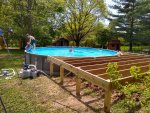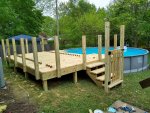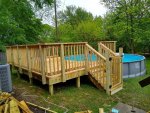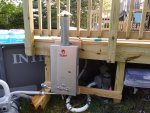Taco Bell and McDonald's put Navien in all their new builds They run duals thos, but they run 24/7. I was in the plumbing supply biz when tankless first came out and people laughed, now its the new stanard. I'm willing to bet it will be in the swimming pool industry too soon. Raypac boilers are VERY similar to tankless heaters, heat excahngers spread further and flow controls different. Same principal, heat a plate and run water over it at the correct rate to get the rise. Complication lays in slowing/speeding the water and pouring in more or less fuel.
Tankless Water Heater to Heat My Pool
- Thread starter stewbets
- Start date
You are using an out of date browser. It may not display this or other websites correctly.
You should upgrade or use an alternative browser.
You should upgrade or use an alternative browser.
Flying Tivo
TFP Guide
- Jan 24, 2017
- 3,100
- Pool Size
- 7500
- Surface
- Plaster
- Chlorine
- Salt Water Generator
- SWG Type
- Pentair Intellichlor IC-40
What you are actually doing has been done before by the heater company, they are called destructive testing. They try to figure out all the ways a heater might fail. I bet they already have that info, if you wish to mail them. That way you will have a more exact estimate, but most probably would be confidential information.
About the cleaning of the heater i would suggest around every 60 hours of use. At least that is the equivalent in time of what Rinnai suggest(6months of normal use). You can make assumptions with poolmath at your CSI depending on the temperature of the heat exchanger output. You might be able to compensate a little your chemistry to benefit scaling inside the heater.
Safety first always!
About the cleaning of the heater i would suggest around every 60 hours of use. At least that is the equivalent in time of what Rinnai suggest(6months of normal use). You can make assumptions with poolmath at your CSI depending on the temperature of the heat exchanger output. You might be able to compensate a little your chemistry to benefit scaling inside the heater.
Safety first always!
Back to my project. I got my pool filled last night and the kids got in the 64 degree water for a little bit. I think they're crazy. I was amazed by how much junk was in the pool due to all the falling spring blossoms, but this is my first year using a skimmer. They're fantastic! Cleared everything up in short order.
My next step was to try to get the heater connected. I think I mentioned it earlier, but my plan was to use a smaller pool pump to run a separate heater circuit since this heater is so restrictive. It would not be wise to put my main pump and filter inline with it because it would cut the flow down excessively. Anyhow, one of my little pumps does not generate enough pressure to trigger the heater to turn on, so I connected two of them in series. Now we're in business! With that setup, I was seeing a 59 degree rise in the water. That tells me I'm not moving as much water as before when I tested it with house water pressure. And as long as the efficiency is comparable to before (3 gpm raised 38 degrees) then I'm OK with this. I'll probably test my new gpm a little later to confirm the efficiency.
I also ran the heater for 20 minutes straight to test if it would shut off like it claims, and it did. I think my next step is to connect the thermostat and timer to it. My initial plan is to set the timer up to run for around 20 minutes at a time and then shut off for 10 minutes or so. To be clear, the way it works is the heater fires when it senses water pressure, so the thermostat will connect to the pumps, and the pumps will be plugged into the timer. As long as the thermostat is calling for heat, the timer will turn the pumps on for 20 minutes and off for 10 minutes in a cycle. I imagine I’ll end up tweaking this interval as I progress.
It rains a lot in the spring and I’ve got a deck to build for this pool, so I’ll be devoting much of my time to that project, but I’ll certainly report back about the progress and viability of this heater. I’ll also get some pictures up at some point.
My next step was to try to get the heater connected. I think I mentioned it earlier, but my plan was to use a smaller pool pump to run a separate heater circuit since this heater is so restrictive. It would not be wise to put my main pump and filter inline with it because it would cut the flow down excessively. Anyhow, one of my little pumps does not generate enough pressure to trigger the heater to turn on, so I connected two of them in series. Now we're in business! With that setup, I was seeing a 59 degree rise in the water. That tells me I'm not moving as much water as before when I tested it with house water pressure. And as long as the efficiency is comparable to before (3 gpm raised 38 degrees) then I'm OK with this. I'll probably test my new gpm a little later to confirm the efficiency.
I also ran the heater for 20 minutes straight to test if it would shut off like it claims, and it did. I think my next step is to connect the thermostat and timer to it. My initial plan is to set the timer up to run for around 20 minutes at a time and then shut off for 10 minutes or so. To be clear, the way it works is the heater fires when it senses water pressure, so the thermostat will connect to the pumps, and the pumps will be plugged into the timer. As long as the thermostat is calling for heat, the timer will turn the pumps on for 20 minutes and off for 10 minutes in a cycle. I imagine I’ll end up tweaking this interval as I progress.
It rains a lot in the spring and I’ve got a deck to build for this pool, so I’ll be devoting much of my time to that project, but I’ll certainly report back about the progress and viability of this heater. I’ll also get some pictures up at some point.
My thoughts exactly. A pool heater is a tankless water heater. Obviously it has been optimized for the task, but it's still a tankless or on demand heater. I'm not proposing something entirely alien to the pool industry here. Thanks for the cleaning information, by the way!Raypac boilers are VERY similar to tankless heaters, heat excahngers spread further and flow controls different. Same principal, heat a plate and run water over it at the correct rate to get the rise. Complication lays in slowing/speeding the water and pouring in more or less fuel.
I made some progress with my deck this weekend. Almost ready to screw on the deck boards. The heater will get installed after I finish this.
Attachments
Last edited:
This past weekend was what I would consider the official opening of our pool. The kids swam in it earlier when the water was in the 60's, but that was brief. I turned my heater on Friday evening around 10:00 PM with the pool covered. The low was 68 that night and Saturday was our first day of solid hot weather (high of 86). The starting temperature of the water was 70 and by 7:00 PM it was up to 84. So, we got 14 degrees in 19 hours. That's right on pace with what I was hoping this setup could do after my initial testing, so I am pleased. I'm sure we got some help from the warm weather on Saturday, but that heater definitely did some work. I'm still tinkering with exactly how I want to feed the heater. I've used my dinky pumps in tandem and that mostly works, but is a little unreliable. I've also used the main pump with a tee to divert part of the pressure to the heater, but with the 20 minute reset I have to do to keep the heater operating, it defeats the built-in pump timer that coincides with my SWG. This is probably more than most would want to mess with, and some of the responses I've received have indicated that, but I enjoy it. However, sunscreen would have been a great idea. My shoulders are paying the price right now.
Attachments
cfherrman
TFP Guide
" hold my beer, watch this"  Kidding isn't a pool heater a giant tank less water heater ? If you have it and want to experiment why not but my gas heater is 400K BTU and takes a while to heat my pool..Plus your losing heat while adding
Kidding isn't a pool heater a giant tank less water heater ? If you have it and want to experiment why not but my gas heater is 400K BTU and takes a while to heat my pool..Plus your losing heat while adding 
You're right!Nice, your vent pipe is not tall enough
Do you have a magical pool that doesn't lose heat while it's being heated? I'm pretty sure we're all in the same boat on that one. And I think I've sufficiently demonstrated that my setup can effectively heat my pool. No, it's not a 400K BTU heater. My pool isn't 18,000 gallons either. And I didn't have a tankless water heater laying around. I purchased it for $80 for this purpose and I'm glad that I did. It's perfect for our $360 pool. I'm not competing with anyone else's setups, but just trying to share my cost-effective project for others not looking to invest $10,000+ in a pool." hold my beer, watch this"Kidding isn't a pool heater a giant tank less water heater ? If you have it and want to experiment why not but my gas heater is 400K BTU and takes a while to heat my pool..Plus your losing heat while adding

Not knocking the ideaDo you have a magical pool that doesn't lose heat while it's being heated? I'm pretty sure we're all in the same boat on that one. And I think I've sufficiently demonstrated that my setup can effectively heat my pool. No, it's not a 400K BTU heater. My pool isn't 18,000 gallons either. And I didn't have a tankless water heater laying around. I purchased it for $80 for this purpose and I'm glad that I did. It's perfect for our $360 pool. I'm not competing with anyone else's setups, but just trying to share my cost-effective project for others not looking to invest $10,000+ in a pool.
You're good. I just wanted to clarify a few things. This hasn't been a popular idea with the big players around here, so I may be a little on the defensive. I am curious to see what my bill looks like. I should try to measure usage at the meter.Not knocking the ideajust mentioned it. I have seen people use a black hose coiled up and claimed it worked. I heated My pool from 60 to 82 in a day and gas bill went up maybe $25. Of coarse it didnt stay that warm long ?
My heater pump arrived a couple days ago and I got that plumbed in. It's a dirt cheap 1/2 HP pump that I've been impressed with so far. I'm now getting a temperature rise of around 42 degrees through the heater, which is consistent with what it is advertised to do. This tells me my new pump has more pressure than the other setups I tried. I'll have to re-test how long it takes to get up to temperature this weekend, but at this point I'm content with the components of my setup. I'll list them below with links for anyone that's curious:
Natural Gas Tankless Water Heater - $80

1/2 HP Pump - $30

Thermostat with Probe - $5

 www.ebay.com
www.ebay.com
Timer Outlet - $14
Natural Gas Tankless Water Heater - $80

12L Natural Gas Tankless Hot Water Heater 3.2GPM Instant Boiler Stainless Steel | eBay
Find many great new & used options and get the best deals for 12L Natural Gas Tankless Hot Water Heater 3.2GPM Instant Boiler Stainless Steel at the best online prices at eBay! Free shipping for many products!
www.ebay.com
1/2 HP Pump - $30

Pumps for Sale - eBay
Find the best Pumps at the lowest price from top brands like Flotec, Wayne, Goulds & more. Shop our vast selection of products and best online deals. Free Shipping for many items!
www.ebay.com
Thermostat with Probe - $5

Sensor Switch EM-THERM-0004-KIT Digital Thermostat Temperature Control Module for sale online | eBay
Find many great new & used options and get the best deals for Sensor Switch EM-THERM-0004-KIT Digital Thermostat Temperature Control Module at the best online prices at eBay! Free shipping for many products!
Timer Outlet - $14
Timer Outlet, Multifunctional Infinite Cycle Programmable Plug-in Digital Timer Switchor for Appliances, Overload Protection, Light Timer 15A/1800W: Amazon.com: Industrial & Scientific
Timer Outlet, Multifunctional Infinite Cycle Programmable Plug-in Digital Timer Switchor for Appliances, Overload Protection, Light Timer 15A/1800W: Amazon.com: Industrial & Scientific
www.amazon.com
Poolzzz
0
What's the maximum working pressure for the heater? That pump is likely overpressure with 240 ft of dynamic head (over 100 psi).
cfherrman
TFP Guide
If it's a house water heater it's good, stuff needs to be tested for that much psi. My house pressure is up to 60 psi and I can set it higher
I'm not sure on that one. I'm getting a higher temperature rise with the pump hooked up to it than I did with municipal tap, so the pump is lower pressure than my house. I'm not worried.What's the maximum working pressure for the heater? That pump is likely overpressure with 240 ft of dynamic head (over 100 psi).
Poolzzz
0
Test limits and working limits are not the same.
Around here 50 psi is normal working pressure and 80 psi is code limit. But the world is a big place and this particular heater isn't designed for north america so I don't know what it's working ratings are. That's why I asked.
Around here 50 psi is normal working pressure and 80 psi is code limit. But the world is a big place and this particular heater isn't designed for north america so I don't know what it's working ratings are. That's why I asked.
I took some timed readings at my gas meter a few days ago. It appears that my heater is using 55 cubic meters per hour, which would put it at 57k BTU's per hour. This is a little lower than I estimated based on my results, but it's in the ballpark. My heater pump consumes 252W. The total cost to run my heater works out to $.24 per hour. I'm happy with that as that is a relatively low price to pay for results that I have been able to verify. I'd like to share why I settled on a natural gas unit with the following numbers based on my local utilities:
Cost for 1,000,000 BTU's
Natural Gas - $4.63 - (80% efficiency at $.40/CCF)
Heat Pump - $6.45 - (COP of 5 at $.11/kWh)
Resistive Electricity - $32.24 - ($.11/kWh)
Propane - $39.56 - (80% efficiency at $3/gallon for 20-pound tanks)
Natural gas makes sense for me. The only other examples I've seen of people using a tankless water heater with a pool involved using propane versions. This list demonstrates how that is the worst option (at least for my area) that you could take.
Cost for 1,000,000 BTU's
Natural Gas - $4.63 - (80% efficiency at $.40/CCF)
Heat Pump - $6.45 - (COP of 5 at $.11/kWh)
Resistive Electricity - $32.24 - ($.11/kWh)
Propane - $39.56 - (80% efficiency at $3/gallon for 20-pound tanks)
Natural gas makes sense for me. The only other examples I've seen of people using a tankless water heater with a pool involved using propane versions. This list demonstrates how that is the worst option (at least for my area) that you could take.
Thread Status
Hello , This thread has been inactive for over 60 days. New postings here are unlikely to be seen or responded to by other members. For better visibility, consider Starting A New Thread.





